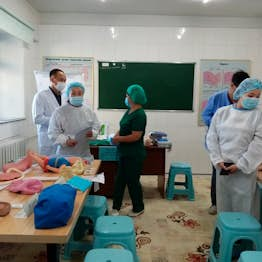Introduction
Since its inception in 2001, bilateral cooperation between Luxembourg and Mongolia has focused on strengthening cardiology services by implementing telemedicine solutions and services in the cardiovascular health sector, both at central level and in the provinces.
Read more
The aim of these interventions is to support Mongolia in the treatment of cardiovascular disease, which continues to be the leading cause of death in the country. Since 2012, the project has achieved national coverage.
In addition, Luxembourg Development Cooperation has been supporting the maternal and child health care sector in Mongolia since 2007 through the United Nations Population Fund (UNFPA). Talks have been launched with the Mongolian authorities in order to jointly identify future support from Luxembourg in these two areas.
Because of the COVID-19 pandemic and, more specifically, the closure of the borders since January 2020, there has been a severe impact on the delivery of the programme, leading to its extension for a year in order to move those activities in the project that have not been implemented to 2021.
In the context of the response to COVID-19 in Mongolia, Luxembourg Development Cooperation has supported two interventions since June 2020, with budgets of EUR 345 000 and EUR 486 200 respectively.
The first contribution made it possible to provide a positive response to a request from the United Nations Population Fund (UNFPA) to boost the capacities of the maternal health services through the uninterrupted supply of vital services to pregnant women, in Ulaanbaatar and in four border provinces. In addition, the project sought to protect the safety and dignity of women and girls in quarantine, including healthcare providers.
The second contribution was launched in collaboration with LuxDev, with the aim of boosting the capacities of cardiovascular services as part of the fight against COVID-19. It made various types of biomedical and essential protective equipment available that were needed in order to prevent the spread of the virus and for the treatment of COVID-19 patients with underlying cardiovascular disease.
Finally, in July 2021, another UNFPA project with a total budget of USD 600 000 was funded by Luxembourg Development Cooperation. This new transition project aims to ensure the protection of maternal, sexual and reproductive health and rights in Mongolia and specifically in the city of Ulaanbaatar during the COVID-19 pandemic in order to prevent further increases in maternal mortality and the number of unwanted pregnancies.
2021 highlights:
- 534 patients are now enrolled in the heart failure programme, an increase of 13.6% over 2020. In addition, the NCC, in collaboration with other national partners, has launched a study on the prevalence of heart failure in Mongolia.
- After two years of academic training at the University of Maastricht, an interventional cardiologist returned to the NCC and, with his team, introduced new treatment technologies for Mongolia, notably in the treatment of arrhythmias, the implantation of pacemakers and the implantation of intracardiac devices.
- 17 clinical guidelines and protocols for the management of cardiovascular disease have been developed at the national level and are now available to Mongolian doctors.
- During the COVID-19 pandemic, a hybrid version of the MnCardio telemedicine system was developed and is ready to be used for telecommunication between doctors treating COVID-19 patients.
- In 2021, the project’s capacity-building and prevention activities continued in a digital format (using webinars). A total of 4 100 medical staff members were trained via an online educational platform.
- The two major annual events, the Winter Seminar and the National Cardiovascular Disease Conference, were held entirely in digital form in 2021 and attended by more than 1 900 participants.
- Because of the COVID-19 pandemic, the total number of open-heart surgeries performed at the NCC decreased from 178 (in 2020) to 149 in 2021. Since no external surgical support or on-site training was performed in 2021, these surgeries were performed independently (without peer support) and often by “junior” surgeons with less than 20 years’ experience. Thus, 68 of the 149 open-heart surgeries were performed by these junior surgeons who will take over in a few years.
